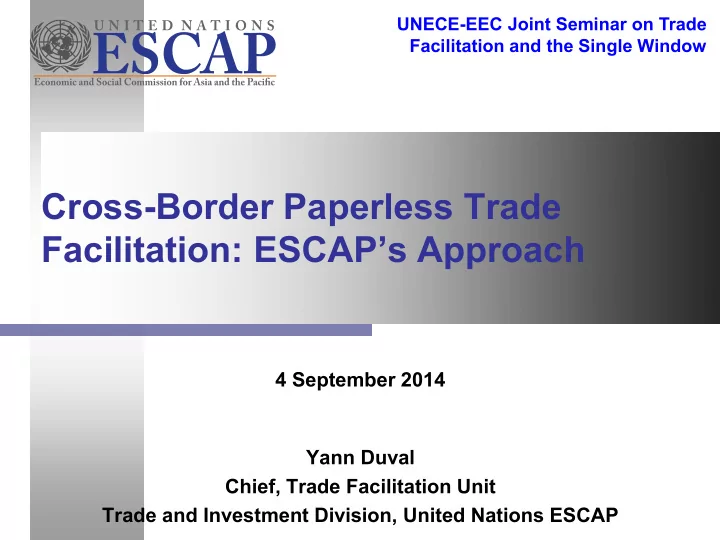

UNECE-EEC Joint Seminar on Trade Facilitation and the Single Window Cross-Border Paperless Trade Facilitation: ESCAP’s Approach 4 September 2014 Yann Duval Chief, Trade Facilitation Unit Trade and Investment Division, United Nations ESCAP
Background of ESCAP Resolution 68/3 ESCAP Resolution on enabling paperless trade and the the cross-border recognition of electronic data and documents (adopted in May 2012) Legal and technical barriers in information exchange (across borders) Increased implementation of (national) single window and paperless trade systems, but Need for cross-border paperless trade 2
ESCAP Resolution 68/3 in Brief Request the Executive Secretary to: 1) support and facilitate the process for the development of regional arrangements on the facilitation of cross-border paperless trade, including by conducting studies, developing potential options, and and in this regard to present its results to the Committee on Trade and Investment at its third session 2) ensure that the regional arrangements take into account and are consistent with the existing international and regional agreements, mechanisms, and undertakings… 3) continue and further strengthen the secretariat’s support for capacity- building activities 3
Implementing ESCAP Resolution 68/3: Regional study of options Done by two regional experts with extensive work experience in customs and trade negotiations Extensive review of relevant literature and projects Contributions from regional experts and nominated national focal points through peer review The regional study recommends a regional agreement that each ESCAP member may voluntarily decide to join, while providing for a flexible trade data exchange mechanism to be developed jointly by the parties to the agreement as the best option for the Asia-Pacific region. 4
Implementing ESCAP Resolution 68/3: Expert Reviews Expert Group Meeting on Enhancing Regional Connectivity through Trade and Investment: Towards Regional Arrangements for the Facilitation of Cross-border Paperless Trade (Bangkok, 13 and 14 March 2013) Reviewed the findings of the study Revised proposed draft text of the regional arrangement Developed an explanatory note A follow-up expert group meeting (Bangkok, 2 and 3 May 2013) 5
Implementing ESCAP Resolution 68/3: Member Consultations Meeting Date Venue Subregional meeting for 9 July 2013 Bangkok South-East Asia Subregional meeting for 12 July 2013 Bangkok South and South-West Asia Subregional meeting for East 24 July 2013 Incheon, Republic and North-East Asia of Korea Regional meeting 12 September Beijing 2013 6
Implementing ESCAP Resolution 68/3: Capacity Building Support 7
Implementing ESCAP Resolution 68/3: Ad Hoc Intergovernmental Meeting Organized in April 2014 at the request of ESCAP Committee on Trade on Investment 30 ESCAP member states participated Collectively reviewed and improved the draft text of a regional arrangement for the facilitation of cross-border paperless trade, but needed more time to finalize it. Decided to establish an interim intergovernmental steering group on cross-border paperless trade facilitation to 1) further improve the draft text and 2) prepare a draft roadmap for the implementation of substantive provisions in the draft text Decision endorsed by the 70 th session of the Commission in August 2014 8
Progress in Implementing ESCAP Resolution 68/3: Next Steps Operationalize Steering Group & Prepare initial draft of a roadmap for cross-border paperless trade First meeting of the Steering Group planned for the last week of February 2014, back-to-back with the 4 th session of the Committee on Trade and Investment. Subsequently, the Steering Group would convene every six months or as agreed in its first meeting, either physically or virtually. 9
Important Considerations for Achieving Cross-border Paperless Trade An effective arrangement likely to require a broad (lengthy) consensus building process Continuous capacity building support of stakeholders (member states) needed to reduce capacity gaps among them Identifying and narrowing both legal and technical gaps needed. Interoperability a key principle, not only among the members, but also at global/regional levels. 1) Use of international standards 2) Use of/alignment with regional legal instruments, such as the ESCAP regional arrangement 10
Thank you More Information on: ESCAP Res. 68/3: http://unnext.unescap.org/reso683.asp United Nations Network of Experts for Paperless Trade in Asia and the Pacific (UNNExT): http://unnext.unescap.org/ ESCAP Trade Facilitation programme http://www.unescap.org/our-work/trade-investment/trade- facilitation 11
Recommend
More recommend